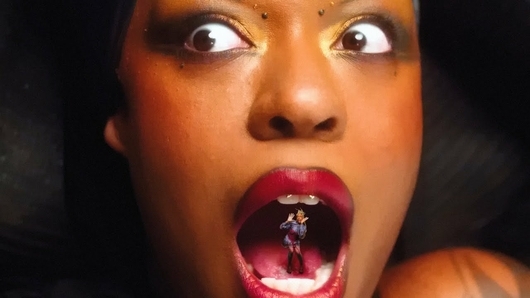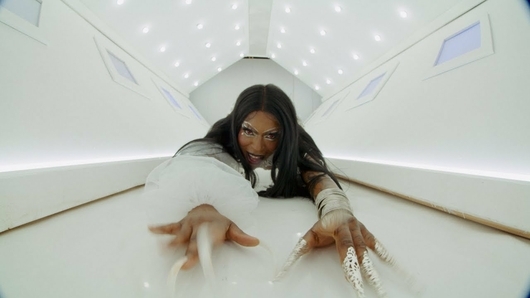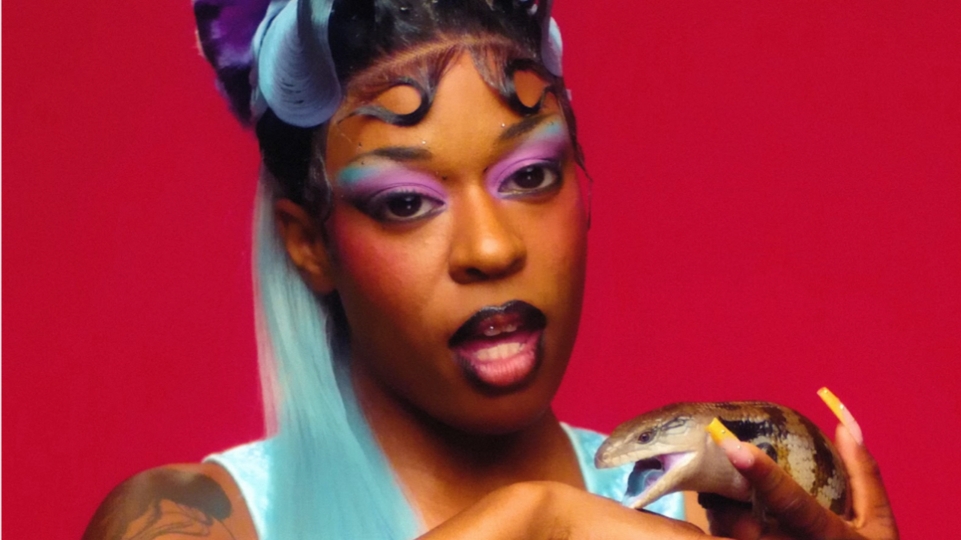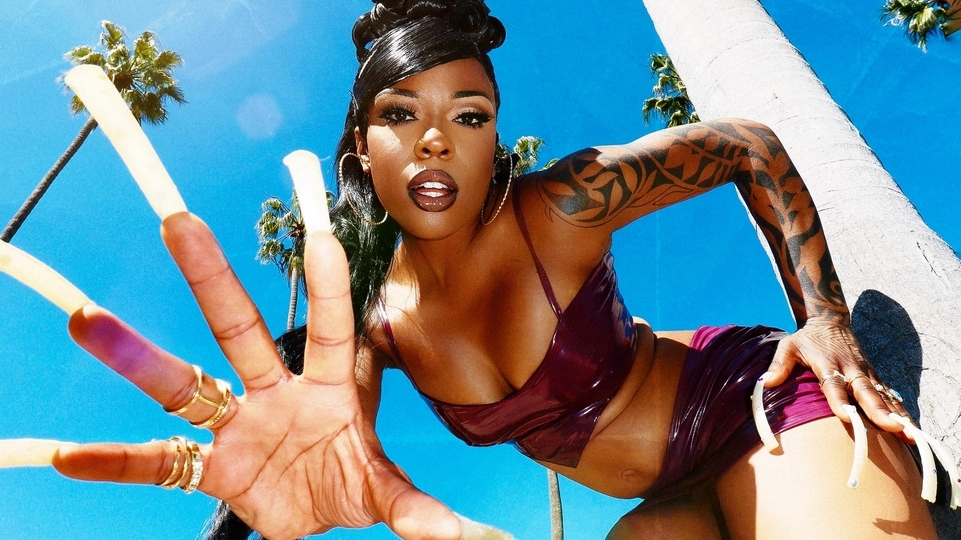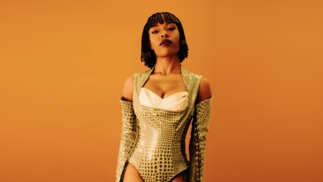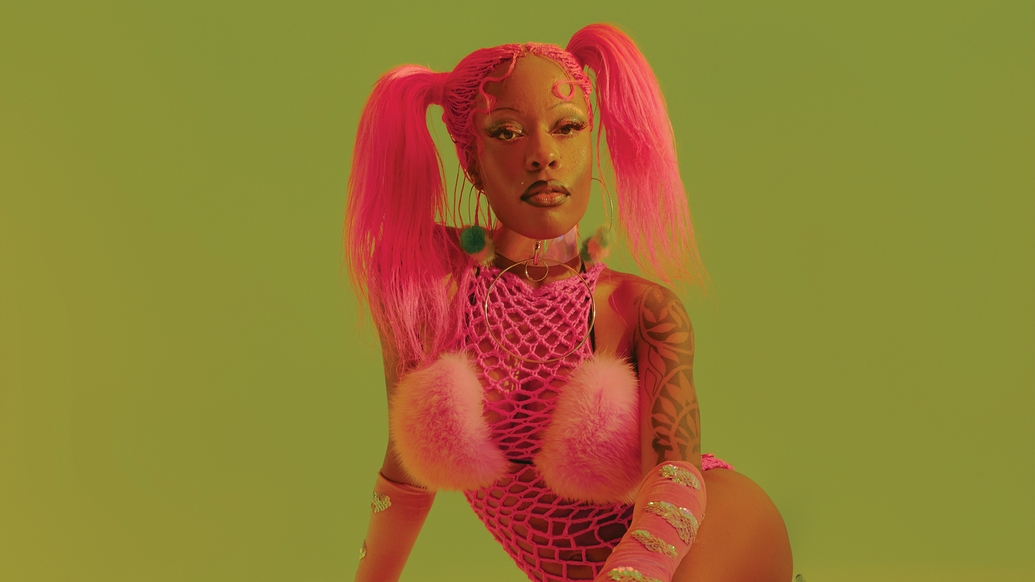
Sudan Archives' radical honesty
A violinist, beat maker and vocalist with a talent for humorous yet heartfelt lyricism, Sudan Archives new album ‘Natural Brown Prom Queen’ is out now on Stones Throw. She speaks to Christine Ochefu about her open-book writing style and her determination to follow her own path
Brittany Parks, the artist known as Sudan Archives, is particularly straight-talking. Donning a purple trapper hat and grin revealing a mouth full of silver braces, she pops out the door of her LA home, where she calls from on a Monday afternoon, reappearing in the Zoom monitor with a lighter and rolled joint in hand. “I needed to go get my weed,” she smiles.
Such is the brand of irreverent humour that runs throughout our time with her. She is cooly sincere, often casually humorous as she calls from her basement studio, surrounded by rows of keyboards and synthesisers. “Sometimes I feel like I'm inappropriate; like I make inappropriate jokes,” she tells us. “I’m really silly. When it comes to making songs at this age, I hope I don't say anything that offends anyone.”
It’s been three years since the release of her debut album ‘Athena’, and now she has dropped her sophomore long-player ‘Natural Brown Prom Queen’. When we ask about her motivations for bringing out this new release, her answer is as comical as it is candid: it is partially due to her contract with label Stones Throw. “I felt like I just had to,” she says, as we break into laughter.
Her album was crafted during the pandemic, a rare creative blessing in her case that shielded from the rush and bustle of music industry deadlines. “Because Covid happened, I feel like I wasn't really moving and making music in that way,” she says. “There was no timeline. It kind of felt like the end of the world.”
And if she made this album to mark the end of the world, she denotes it as epic and all-encompassing. A stunning 18-track release, her longest work to date, it is as much catharsis as it is entertainment. Sudan dances through genres and styles — “electro-fiddle funk R&B,” she christens it during our conversation — to create a statement on herself, and the many orbits around her.
Lyrically, it’s near stream of consciousness, picked up from personal musings that capture her humour, inside jokes and reflections. This is maybe best captured on ‘Ciara’; upon first listen it could easily be mistaken for a love song, as mellow strings and plush tones provide backing to Sudan’s soft vocals. Only upon closer listen is the subject matter evident; it’s a tale about an ex-friend she now hates, the artist professing how she will rally her cousin and his friends to “smack her in her face”.
Such is the open nature of her release. The running theme is home (both her adopted setting of LA and tales of her native Cincinnati, Ohio); her relationships with family, lovers and partners, her skin, hair and body image, all punctuated with giggles, laughter and curses as if listening to an opened journal. “My writing style is very witty. It’s not so much about [a direct] narrative but there’s narratives in there, so kind of conceptual,” she says. “But honestly, it's literally me just talking. And I guess sometimes it rhymes, you know?”
It’s a humble outlook for writing as dense and personal as her own. On title song ‘Natural Brown Prom Queen (Topless)’, she opens with a line as biting as it is truthful: “Sometimes I think that if I was lightskin, then I would get in to all the parties.” It deeply resonates with this writer’s own experiences of colourism as a Black woman in a city with mirroring culture. We tell her this, and she pauses before expanding on her lyrics. “When I first wrote that song I was super nervous about the first line. I remember asking my boyfriend, like, ‘Isn’t that corny to say, or cringey?’ and he was like, ‘No, it’s just honest’.
“I was gonna change the lyrics, I thought of that line as a placeholder. But I just thought that would be too safe — I gotta say what's on my mind and be honest, you know? Because I do feel like that sometimes.”
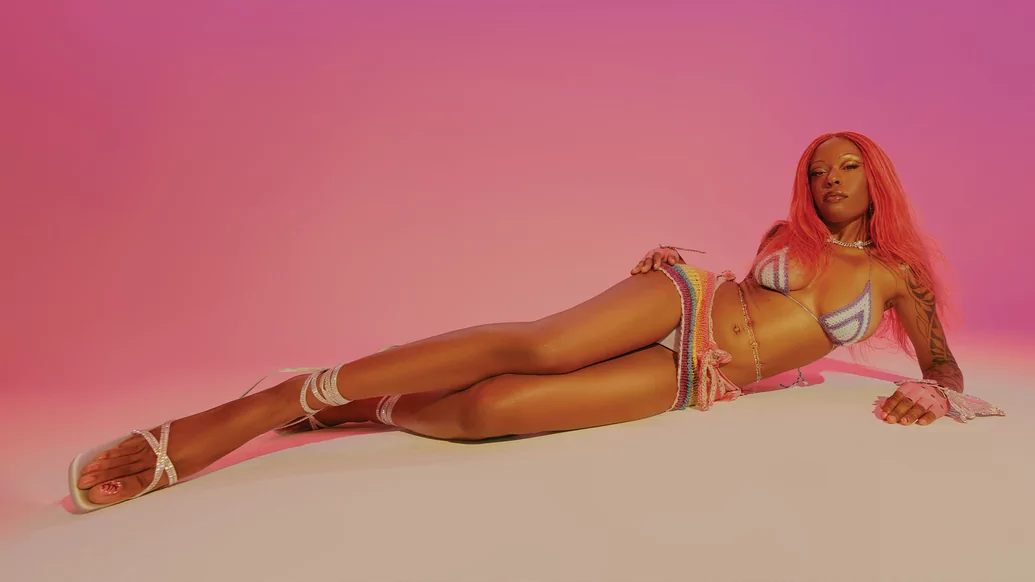
“A lot of my songs are in the pentatonic scale, which you usually hear in healing music, and I listen to meditation music, like, every day. I'm always trying to add that healing sound into the music”
Sonically, she is uncategorisable. When it comes to her wider musical inspirations, the clue is in the name. She is not ethnically East African, ‘Sudan’ rather being a nickname christened by her mother in her early years. But armed with her trusted violin, an instrument she has played since she was 10 years old, she self-taught herself in styles developed by African players in various parts of the continent. The album incorporates these playing styles, as well as the most far-reaching of influences; tracks like ‘Freakalizer’ burst with ‘80s-reminiscent 808 drums produced by LA legend Egyptian Lover, whilst ‘TDLY’ mixes in a frenetic violin sample to fashion the most futuristic of club bangers.
She holds a love for music in the Islamic tradition and many of her favourite string players are Sufis, followers of a form of Islamic practice thought to bring closeness to God. “I'm inspired by a lot of that, their music is very spiritual,” she says. “A lot of my songs are in the pentatonic scale, which you usually hear in healing music, and I listen to meditation music, like, every day. I'm always trying to add that healing sound into the music.”
Now 28, Parks was raised in Cincinnati, Ohio. People described her as shy, even whimsical as a child, and she shunned staying inside the house to instead “be outside in nature and catch animals”. Music was a given in her household; her stepfather had helped create legendary label LaFace Records, once home to the likes of OutKast, TLC and Goodie Mob. And in her early years, her musical palette had been composed of songs played by her mum and older twin sister Christina in the house, the former sharing jazz classics and neo-soul such as India Arie, the latter early 2000s R&B groups like B2K and Destiny's Child.
Violin came to her through a formative concert at school, she says. A group of fiddle players performed and she found herself instantly captivated, convincing her parents to buy her the instrument and honing her skills practising in church.
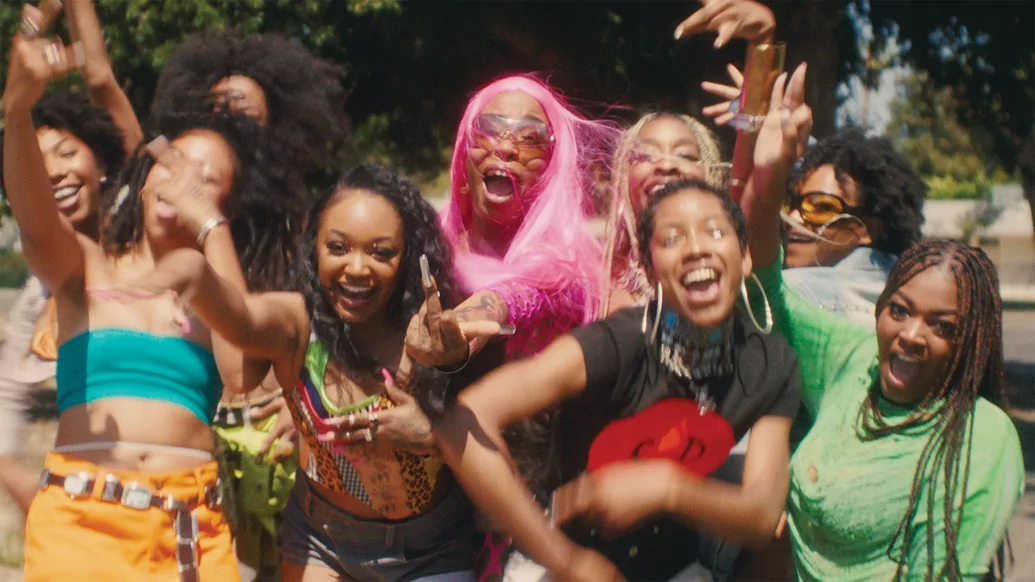
Sudan and her sister used to sing recreationally in the house, with dreams of expanding their craft. In support, their stepfather had tried to fashion them into a duo, N2, making cookie-cutter pop music and R&B. He formulated strict rules on how he would develop the girls as artists, setting 9PM curfews and requesting they practice dutifully for “eight hours a day,” she recalls.
The then-teenage Sudan would stay out late, discovering hidden pockets of electronic music cultivated by younger people in her city (“synthesiser nights”) against a backdrop of the standard jazz and country music scenes. “You go there and people are playing instruments, but they have their computers or some type of electronic gear that's extending the sound in a way,” she explains.
Sudan, who’d always had a penchant for the alternative, rebelled. She wrestled with her family lifestyle, driven by an urge to have musical autonomy. “It didn't work out because I was trying to do my own thing,” she says. “I wanted to learn how to be a producer; he was telling me not to worry about that. But I just wanted to be able to do stuff that was different and unique to me.”
The friction would prove uninhabitable. “I'm 18 now; I didn't graduate high school just to listen to someone else,” she says of her feelings at the time. “To them it seemed like I wanted to party. But really I just wanted to go to the beat scenes, the electronic scenes and the raves because they had the music the way that I was trying to do it. I had to leave the house because I wouldn't follow the rules. So then I moved to LA.”
She settled in the city she now calls her home aged 19, and the music scene would prove formative for developing her sound. She began studying ethnomusicology at Pasadena City College, getting into the local music scene and learning more about African violin styles through her courses. But in the background she had to hustle to keep herself afloat: she’d bounce from house to house, struggling to find work and often gaining employment “under the table”. She runs us through raucous stories of her early time in the city: dealing with racism, jealous baristas, being accused of stealing, tales which put us in floods of laughter.
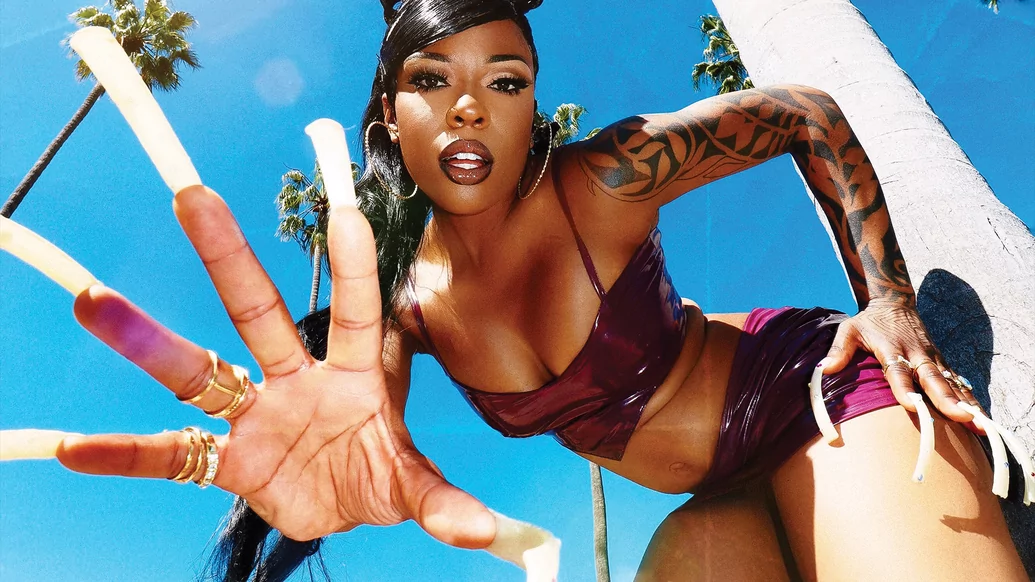
She’d been working one of her many retail jobs, serving in a doughnut shop, when she finally got signed. A chance meeting at seminal LA event Low End Theory set her up with execs at her current label. From then, it was a case of “blowing up and then having to figure out how to be a performer super quick,” she says wistfully. “Two albums from then, and now here.”
Where ‘here’ is, seems to be a continued opening of her personhood. It’s not without its problems, though; since she released her debut EP, she’s found herself reeling with the nature of increased visibility and audience uptake, and dealing with anxiety. “Even though I feel like more people are listening to my music, there was a time where people didn't,” she says. “I naturally have this songwriting style where I just say what's on my mind and in my journal, and I don't really think about if people hear it or not. That's the scary part, because I do feel like a lot of people are hearing it now.”
Despite her fears, it is that very candour that will likely be her winning point. The joy of ‘Natural Brown Prom Queen’ is in the openness she grants to her listeners: a rare glimmer of an artist who is radically vulnerable, in all her glory.
